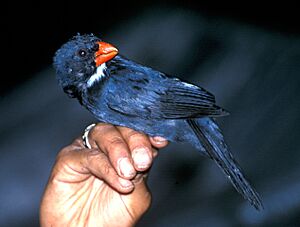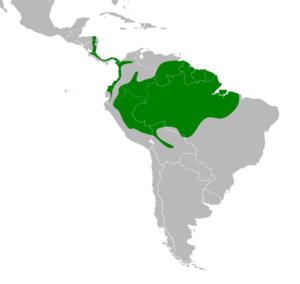Slate-coloured grosbeak facts for kids
Quick facts for kids Slate-coloured grosbeak |
|
|---|---|
 |
|
| Conservation status | |
| Scientific classification | |
| Genus: |
Saltator
|
| Species: |
grossus
|
 |
|
| Synonyms | |
|
Loxia grossa Linnaeus, 1766 |
|
The slate-coloured grosbeak (Saltator grossus) is a type of bird in the Thraupidae family. It's known for its thick beak, which helps it crack open seeds. Most of these birds live in the Amazon Rainforest in South America. You can also find them in the forests of El Chocó in Ecuador and Colombia. Some even live further north in Central America, from Panama all the way to Honduras.
Contents
How the Slate-coloured Grosbeak Got its Name
Scientists use a system called taxonomy to name and group all living things. This helps everyone understand which animal or plant they are talking about.
Early Discoveries
Back in 1760, a French scientist named Mathurin Jacques Brisson wrote about the slate-coloured grosbeak. He saw a bird from "America" and gave it a long French name, Le gros-bec bleu d'Amérique. He also gave it a Latin name, Coccothraustes americana caerulea. However, his Latin names didn't follow the modern two-part naming system.
Linnaeus and the Binomial Name
A few years later, in 1766, the famous Swedish naturalist Carl Linnaeus updated his important book, Systema Naturae. Linnaeus is known for creating the system we use today to name species, called binomial nomenclature. This means every species gets a two-part Latin name.
Linnaeus added the slate-coloured grosbeak to his book. He gave it the scientific name Loxia grossa. The word grossa comes from Latin and means "thick" or "coarse." This likely refers to the bird's strong, thick beak. The first bird of this type that scientists studied came from French Guiana.
Modern Classification
Today, the slate-coloured grosbeak is placed in the genus Saltator. This group was first described by the French bird expert Louis Pierre Vieillot in 1816. So, its full scientific name is Saltator grossus.


